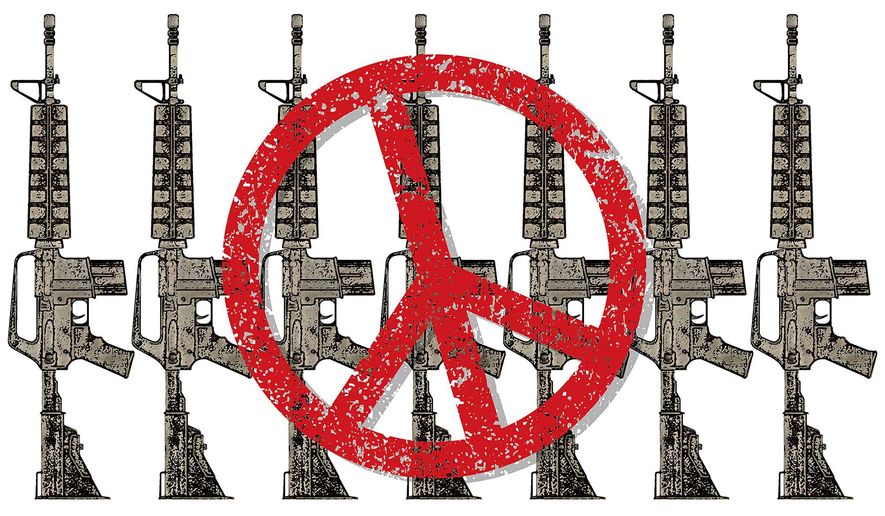OPINION:
This month, the Obama administration announced it would send 1,000 troops to Poland on a regular rotation as part of ongoing efforts to shore up the North Atlantic Treaty Organization’s (NATO’s) Eastern flank. These American troops, said President Obama, will “serve shoulder to shoulder with Polish soldiers” to help out one of our country’s “most committed and important allies.”
Poland is indeed an American ally and stories of the Polish people’s resistance under Soviet rule are stirring stuff. Still, there are two significant problems with Mr. Obama’s call on this one.
First, and nothing against Poland here, most European nations are not living up to their obligations under NATO to provide troops and other support for the collective defense. The Wall Street Journal reported that America spent more on its military bands last year than five of our lowest-spending NATO allies spent on their entire militaries. Now, maybe America’s military spends too much on fanfare, but come on.
The fact that the United States spent more on strings and brass sections than Slovenia ($401 million), Latvia ($281 million), Luxembourg ($249 million), Albania ($132 million) and Iceland (a whopping $0) spent on their armies tells us that European countries have gotten far too used to America keeping the peace for them. In fact, only 5 of the 28 NATO member states (with Poland as one of the exceptions, along with the United States, obviously; Greece; the United Kingdom and Estonia) are spending the agreed upon 2 percent of Gross Domestic Product for defense.
NATO is supposed to be a collective security guarantee, with all allies chipping in and pulling their weight.
They are instead spending those funds on more lavish European welfare programs, among other things.
Even Mr. Obama admits that many European nations really aren’t doing the minimum. “Free riders aggravate me,” he explained to the Atlantic magazine. The president likened the preferred approach of the “Europeans and the Arab states” to “holding our coats while we [do] all the fighting.” He argued that the U.K. met its minimum NATO obligation only because he had frankly lectured former Prime Minister David Cameron that “You have to pay your fair share.”
And yet, Mr. Obama’s decision to send these troops into Poland only makes it more likely that they’ll continue to free- or cheap-ride on American taxpayer-funded forces in the future.
Second objection: Russia will take this very badly. It could do something rash as a result. The Military Times reported that “by using rotating battalions, the U.S. is technically living up to a 1997 treaty with Russia that prohibits ’additional permanent stationing of substantial combat forces’ in Eastern Europe,” but strongman Vladimir Putin will be entirely unsatisfied by that lawyerly workaround. And indeed Mr. Putin complained through a spokesman about anti-Russian hysteria emanating from the latest NATO Summit.
The fact that an action will anger Russia is not always good enough reason for not doing it. Yet at a minimum it should make our leaders stop and think things through for a moment before going ahead. That doesn’t seem to be the case here. At the NATO summit, Mr. Obama said “there can be no business as usual with Russia” until it settles the issue of Eastern Ukraine. The region has been the site of fighting between official and unofficial Ukranian and Russian forces for several years now and the subject of negotiated cease-fires that are always threatening to come undone.
Kremlin spokesman Dmitry Peskov warned through an official Russian news agency that “if one needs badly to look for an enemy image so that [one can] promote anti-Russian, so to say, hysteria, and then, with this emotional background, to deploy more and more air force units, ground troop units, getting them closer to the Russian borders, then one can hardly find any common ground for cooperation.”
It is completely understandable that Mr. Obama would be frustrated by the situation in Ukraine and that Eastern European nations, being right next door to Ukraine, would worry about future Russian encroachments. But is the right response to preemptively send in forces, or is that simply inviting more trouble?
The United States already has forces garrisoned in Europe that could be redeployed to Poland to help our NATO ally if Russia did anything truly threatening. Is it worth sending 1,000 of our already stretched-thin troops on regular rotation just to make a statement? We don’t even need to shake that Magic 8 Ball to tell us, “All signs point to no.”
• Jeremy Lott is a senior fellow at Defense Priorities.




Please read our comment policy before commenting.